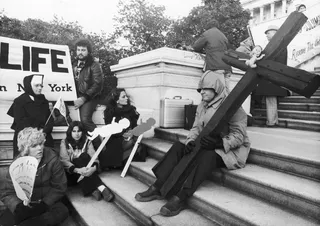Reproductive Rights on Trial
Roe v. Wade and other important cases.

1 / 10
The Fight for Women's Rights - On April 5, a federal judge in New York ordered the U.S. Food and Drug Administration to allow a person of any age to purchase the so-called "morning after pill" without a prescription. The move overturns a 2011 decision requiring a prescription for Plan B One-Step contraception for women under age 17. While the future impact of this ruling remains to be seen, there are a number of landmark reproductive rights cases decided by the U.S. Supreme Court that have shaped the current state of women's health in the United States. — Britt Middleton (Photo Illustration: Justin Sullivan/Getty Images)

2 / 10
Griswold v. Connecticut (1965) - This case concerned a Connecticut law banning "any drug, medicinal article or instrument for the purpose of preventing conception" for all, including married couples. The High Court upheld that the U.S. Constitution protects privacy rights for individuals concerning childbearing and other intimate matters. (Photo: Evening Standard/Getty Images)

3 / 10
Eisenstadt v. Baird (1972) - The right for unmarried individuals to obtain contraceptives was the center of this 1972 case, where the Supreme Court struck down a Massachusetts law restricting access to contraceptives to married couples with a prescription from a physician. (Photo: POST-ARCHIVE/GettyImages)

4 / 10
Roe v. Wade (1973) - Perhaps the most influential cases concerning reproductive rights, the landmark Roe v. Wade decision overturned a Texas law barring all abortions unless to save the life of the mother. The Court ruled that it was a woman's constitutional right to decide whether to terminate a pregnancy and a state could not interfere unless it had compelling reasons. (Photo: Peter Keegan/Keystone/Getty Images)

5 / 10
Bigelow v. Virginia (1975) - Supreme Court justices decided in this case that states could not ban advertising for abortion clinics due to freedom of speech and freedom of the press protections under the First Amendment. (Photo: Keystone-France/Gamma-Keystone via Getty Images)
Photo By Photo: Keystone-France/Gamma-Keystone via Getty Images
ADVERTISEMENT

6 / 10
Bellotti v. Baird (1979) - In this 1979 decision, the High Court struck down a Massachusetts law requiring women under 18 to have parental or judicial consent to terminate a pregnancy. States are allowed to establish alternative procedures to determine the maturity of the minor but those proceedings must be confidential and expeditious. (Photo: GettyImages)
Photo By Photo: Getty Images/STOCK

7 / 10
Rust v. Sullivan (1991) - This case brought by a group of family planning providers challenged the Reagan administration's ban on abortion counseling and referral by programs funded by Title X of the federal Public Health Service Act. The court ruled that the restrictions did not violate freedom of speech under the First Amendment. However, President Bill Clinton repealed the regulation by executive order in 1993. (Photo: GREG GIBSON/AFP/Getty Images)

8 / 10
Schenck v. Pro-Choice Network of Western New York (1997) - While peaceful protesting is protected as free speech, this case established a 15-foot buffer area around doorways, driveways and parking lot entrance areas around abortion clinics, but stuck down a 15-foot zone around people or vehicles entering or leaving the premises. (Photo: Jeff Mitchell US / Reuters)

9 / 10
Ferguson v. City of Charleston (2001) - Supreme Court justices overturned the Medical University of South Carolina's policy on involuntary drug testing for women receiving prenatal care under the Fourth Amendment, which protects against unreasonable searches and seizures. (Photo: GettyImages)
